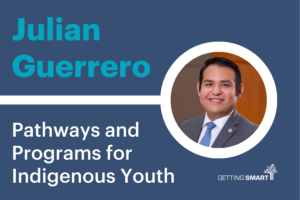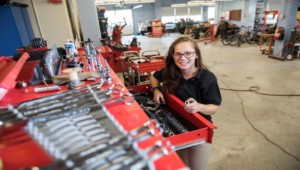Creativity and Accountability
Yong Zhao is back in receptive Seattle this week preaching his gospel of edu-innovation. The anti-standards, pro-creativity Zhao is a Chinese-born prof at Michigan State. Here’s his thesis in a nutshell:
In my new book Catching Up or Leading the Way, I mostly focus on issues facing education in the United States noting that the current education reform efforts, with their emphasis on standards, testing, and outcome-based (read test score-based) accountability, are unlikely to make Americans “globally competitive.”
Zhao and I like the same schools and probably share a similar vision for what a good education looks like and the benefits it provides students. We both agree that bad standards and tests badly applied is bad for kids.
But his anti-standards mantra strikes me as a bit irresponsible in the sense that he doesn’t grapple with accountability. We have NCLB because states were not fulfilling the good school promise—they ignored generations of chronic failure. The Department of Education is now grappling with a new accountability framework, one that is tight on goals and loose on means.
The challenge is how to promote creativity and accountability—to ensure that every American student has access to at least one good school and a rich engaging series of learning experiences that focuses on big questions not little test bubbles. This is no easy task, but a new generation of adaptive and content embedded assessment holds the potential for making testing far less intrusive and far more constructive for teachers and students.
I’m worried that most of the state consortia winning grants from the upcoming $350 million RttT pot will create some consistency around the Common Core but do little to advance the field of assessment—a big missed opportunity. A few states will propose a comprehensive assessment system that incorporates adaptive assessment (e.g., online quizzes and feedback from learning games), performance assessment (e.g., essays and science projects), as well as end of course exams.
This is also why states need a special purpose charter authorizer for innovative schools—a potential test bed for new instructional models and assessment systems. Innovative school models that combine personalized online learning with onsite application and support have the potential to promote creativity and accountability—something Dr. Zhao and I can both celebrate.






corrigandl
A co-worker of mine introduced me to your blog after I showed him the address from Dr. Zhao at the 2009 WSSDA conference.
I agree with most of what you say - bad standards and tests improperly applied is not good for public education, nor is letting the federal government do an end run around local controls by using RttT as a way to promote their view of education and then using those funds for other things while we continue to improperly apply bad standards and tests.
You mentioned, though, Dr. Zhao has an anti-standards mantra - and I dont think that is it at all. I think he is for standards, as long as they are applied for all areas of education - not just reading, writing and math, but art and social science and other things as well. As in the "real world", there are many different avenues to succeed, and locking standards down to so few subjects minimizes the value of the others.
You also talked about teacher accountability, and I think this is a huge problem with public schools in this state. I think most K-12 teachers started their careers with the desire to be teachers. It's not like they chose this profession because they couldnt make it in another field - they wanted to teach, at least at the beginning. I think trusting teachers is something that has been lost, and I am sorry for it, because I know of teachers who really love to teach, but cant reach their students effectively.
I am a father of five children, all of whom are currently going through our public education system in Washington state. Each child strongly dislikes going to school now - not because of unfair teachers, or unfair standards, or because they are lazy and dont want to learn. They dislike it because of behavioral problems of their classmates.
When you have children that go out of their way to purposely hurt (either physically or emotionally) themselves and others, it makes for an unsafe learning environment. It breaks concentration, it randomizes efforts, and more and more our teachers are called upon to be at best day care providers and at worst mob control. When asked to stop by a peer, it opens that peer to ridicule and bullying. I know of several high schoolers who kill themselves over advanced placement classes for the sole purpose of getting out of the behavioral situations that exists in other classes. And strangely enough, students in AP classes tend to keep raising the bar year after year. Partly because these children are extrememly motivated, but also because it is a safer learning environment.
I challenge anyone who thinks that teachers need to have more accountability placed on them to randomly spend time in classrooms around our state. Let them see what our teachers have to put up with out of their students on a daily basis. I am not talking about those students who struggle with autism or AD/HD or other physcial challenges, but those students who truly have out of control behavioral issues.
I hope someday we can stop talking about how to place more controls on the people who love to do their job and start talking about how to help them actually do it. Why can't we talk about a safe learning environment, or more parental inclusion.
Replies
Tom Vander Ark
Great points, difficult issues.
Having spent time in Indian and Chinese schools in the last year, I've noticed far more compliant behavior and much stronger cultural priority for learning. They've taken focus on standardized tests to a bizarre and dangerous extreme and are trying to figure out how to introduce more creativity into a rigid system.
We have a different problem of a far more diverse system with kids that are supported/compliant and kids that are neglected/disruptive. I think a more engaging and personalized approach to learning with a richer assessment system helps all kids--on that Zhao and I agree.
My main point is, you can't credibly argue against standards/accountability without explaining how low income kids benefit.